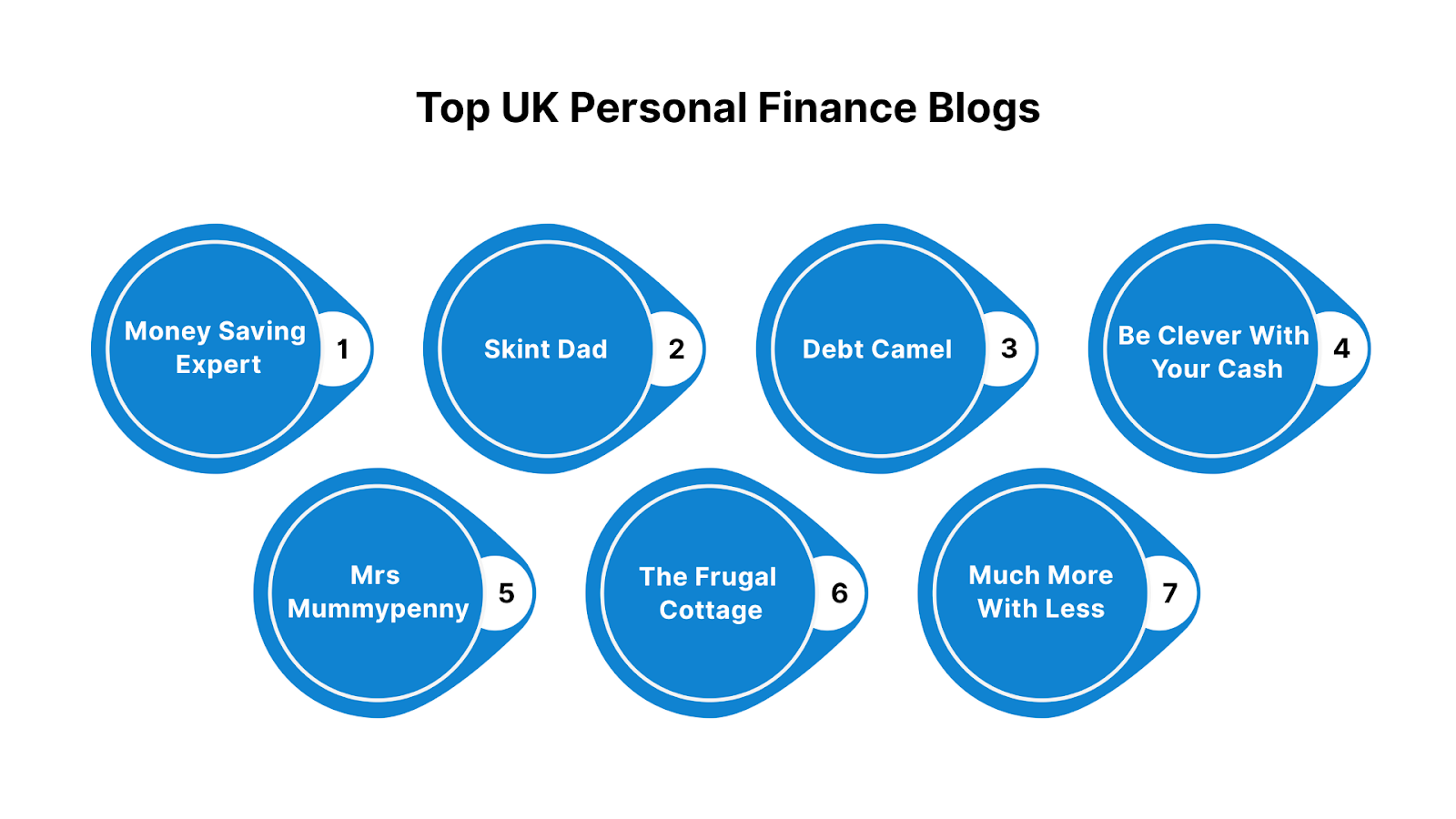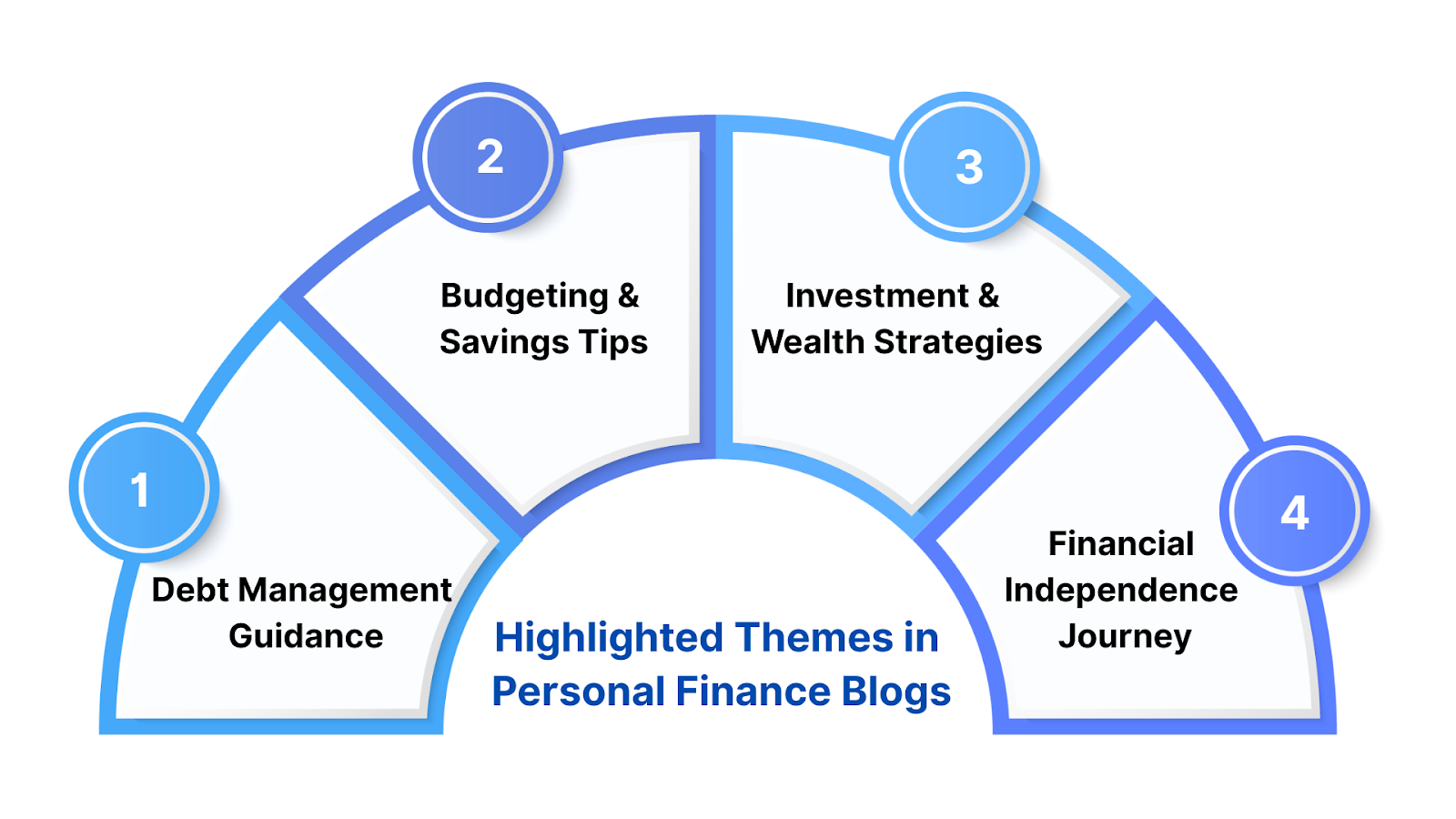Personal finance blogs can be helpful if you want to improve your money management skills. Written by a mix of financial experts, savvy savers, and people who’ve overcome their own financial struggles, these blogs deliver actionable insights you can use right away. They cover a wide range of topics, including debt reduction, saving strategies, and long-term wealth building, all presented in a way that’s easy to understand. Whether you’re just starting out or refining your approach, these blogs can help you achieve your financial goals. Let’s begin with some of the best options from the US

The US boasts a vibrant personal finance blogging community, offering diverse perspectives to suit your needs. Here are five top blogs worth exploring:
The Forest Hill Management blog stands out for its expert-led advice on personal finance. With over 20 years of experience, their team shares practical strategies for managing debt, planning investments, and securing your financial future. You’ll find clear, tailored guidance that’s perfect whether you’re addressing overdue bills or setting long-term goals. It’s an essential read for professional insights you can trust.
The Simple Dollar offers a straightforward approach to money management. Founded by Trent Hamm, who once faced significant debt, this blog covers budgeting, credit card strategies, and frugal living. You’ll appreciate its relatable tips and focus on simplifying complex financial decisions.
Money Crashers provides comprehensive advice on personal finance, from credit card management to homeownership. Its detailed guides help you make informed decisions, whether you’re saving for a big purchase or optimizing your spending. You’ll appreciate its focus on actionable steps for everyday financial challenges.
Also Read: How to Select a Financial Expert: Types and Roles
The College Investor targets young adults, especially those understanding student loans and early career finances. It offers straightforward tips on paying off debt, starting to invest, and building credit. If you’re a recent graduate or young professional, this blog is a must-read for establishing strong financial habits.
Budgets Are Sexy, run by J. Money, brings a fresh and engaging take on personal finance. It’s packed with advice on tracking your net worth, saving creatively, and staying motivated. If you want a blog that makes finance fun while keeping it practical, this one’s for you.
Afford Anything, led by Paula Pant, challenges you to rethink your relationship with money. With a focus on financial independence and real estate investing, it’s ideal if you’re aiming to break free from the 9-to-5 grind. You’ll gain insights into building wealth on your terms.
Money Under 30 targets younger adults in their early financial years. It offers beginner-friendly advice on credit, student loans, and starting investments. If you’re in your 20s or 30s and want to establish solid habits, this blog is a great starting point.
These US blogs provide a strong mix of expertise and practicality. Now, let’s shift focus to the UK and see what their top personal finance blogs have in store for you.

The UK’s personal finance scene is just as robust, with blogs tailored to local financial systems and challenges. Here are five standout options:
Money Saving Expert, created by Martin Lewis, is a powerhouse of cost-cutting advice. You’ll find tips on securing the best deals, reducing utility bills, and understanding your rights as a consumer. It’s a top choice if saving money is your priority.
Skint Dad, run by Ricky and Naomi Willis, shares practical ways to stretch your budget. From bargain hunting to side hustles, it’s perfect for families or anyone living on a tight income. You’ll discover creative ways to make your money go further.
Debt Camel, written by Sara Williams, specializes in debt solutions. It offers clear advice on managing loans, negotiating with creditors, and understanding insolvency options. If you’re tackling debt, this blog provides expert guidance tailored to UK regulations.
Be Clever With Your Cash, run by Andy Webb, focuses on smart spending and earning rewards. From cashback offers to budgeting tools, this blog helps you maximize your money. You’ll enjoy its clear, no-fuss approach to personal finance.
Mrs Mummypenny, written by Lynn Beattie, offers family-friendly financial advice. It covers saving on household expenses, managing debt, and teaching kids about money. If you’re juggling family finances, this blog has relatable solutions for you.
The Frugal Cottage, authored by Nicola Richardson, emphasizes simple living and financial freedom. You’ll discover strategies for cutting costs, boosting savings, and pursuing independence. It’s perfect if you’re drawn to a minimalist financial mindset.
Much More With Less, by Faith Archer, blends frugality with lifestyle tips. It’s ideal for rural dwellers or anyone looking to save while enjoying life. You’ll find advice on budgeting, pensions, and making the most of limited resources.
These UK blogs offer valuable insights tailored to their audience. Next, let’s explore the common themes you’ll encounter across these resources and why they matter to your financial journey.

Personal finance blogs often center on a few key topics that can shape your approach to money. Here’s a closer look at four recurring themes:
Debt can weigh heavily on your finances, but blogs like Forest Hill Management and Mrs Mummypenny provide effective solutions. You’ll learn techniques like the debt avalanche method or how to negotiate with creditors, helping you regain control step by step.
Mastering your budget is foundational, and blogs such as The Simple Dollar and Be Clever With Your Cash excel here. They share hacks like envelope budgeting or automating savings, ensuring you spend wisely and save consistently.
Growing your wealth takes planning, and blogs like Afford Anything and The Frugal Cottage dive into investing basics. You’ll explore options like stocks, property, or index funds, with tips to build a portfolio that suits your goals.
The dream of financial independence inspires many, and blogs like Budgets Are Sexy and Much More With Less show you how it’s done. They share stories and strategies for retiring early or living life on your own terms, motivating you to take action.
These themes offer a roadmap for financial success. To make the most of them, let’s look at some practical ways you can engage with personal finance blogs.
Also Read: Guide to Asset Allocation and Portfolio Composition
Personal finance blogs can be a powerful resource for building your financial knowledge, but engaging with them effectively requires a strategic approach. Here’s how to make the most of these blogs wisely:
By actively using these blogs, you’ll see tangible improvements in your finances. Let’s wrap up with some final thoughts on why these resources are worth your attention.
Personal finance blogs are your allies in building a stronger financial future. They deliver expert advice, creative ideas, and real-world strategies to help you manage debt, save smarter, and grow your wealth. The US and UK blogs highlighted here offer a wealth of knowledge to explore, no matter where you are on your financial path. Take the time to dive into these resources, and watch your confidence and skills grow.
If you’re looking for personalized support, Forest Hill Management has you covered. With decades of experience, our team provides tailored financial solutions to meet your unique needs. Reach out today to discover how we can help you achieve your goals.
Q1. Why should I follow personal finance blogs?
They offer free, practical advice on budgeting, saving, investing, and debt management—often from people with real-life experience or professional expertise. Blogs are also updated regularly, so you stay current with financial trends.
Q2. How do I know if a finance blog is trustworthy?
Check the author’s credentials (e.g., financial certifications), read the quality of their references, and look for transparency. Credible blogs often cite sources and avoid making unrealistic promises.
Q3. Can I rely solely on personal finance blogs for financial planning?
Blogs are great for foundational knowledge and tips, but they’re not a substitute for personalized financial advice. Use them to educate yourself, then consult a certified advisor for big decisions.
Q4. What’s the difference between US and UK personal finance blogs?
US blogs focus on topics like credit scores, 401(k) plans, and student loans, while UK blogs cover ISAs, pensions, and local consumer rights. Choose based on your location for relevant advice.
Q5. How do I make the most of these blogs?
Set specific goals—like improving your credit score or saving for a house—and use blogs to find step-by-step guidance. Track your progress and revisit helpful blogs as your situation evolves.